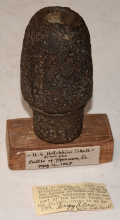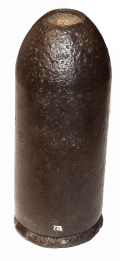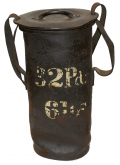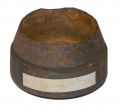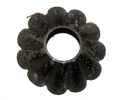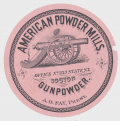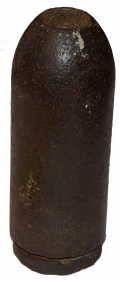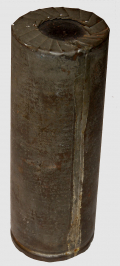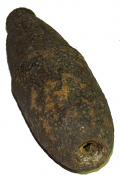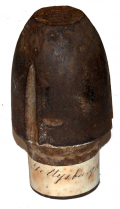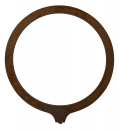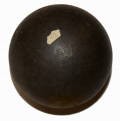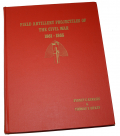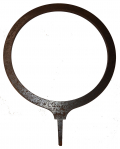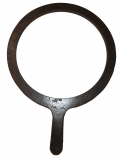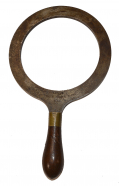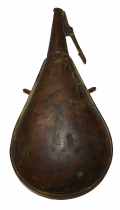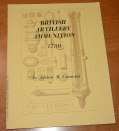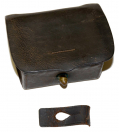site search
online catalog
Artillery
Showing 1 to 50 out of 59
FIRED U.S. 3” HOTCHKISS CASE-SHOT - DANNER MUSEUM COLLECTION
Offered here is a very nice excavated Union artillery shell that was fired and, partially, detonated. This is an iron, 3” Hotchkiss artillery shell that was intended to be fired from a 10-pounder… (2025-2424). Learn More »
$975.00
SOLD
NOSE OF 3” HOTCHKISS SHELL FROM MANSURA, LOUISIANA -- GREG COCO COLLECTION
This relic is the nose portion of a three-piece U.S. 3” Hotchkiss artillery shell. The iron is rusty and heavily pitted. There are three flame grooves, fuse hole but no fuse, and a small piece of… (1300-42). Learn More »
$125.00
ON HOLD
IRON HANDSPIKE HOOK FROM CANNON CARRIAGE FROM FT. DERUSSY CASEMATE -- GREG COCO COLLECTION
This relic is an iron hook is believed to be from a 6-pounder cannon carriage. This would be the hook the handspike was suspended from. This measures about 4” x 2.25”. This piece features a hole… (1300-48). Learn More »
$95.00
ON HOLD
NICE “DUG” US 20-POUNDER PARROTT SHELL
The standard ammunition for the large, 3.67-inch, 20-pounder Parrot rifled cannon. This shell was fired and is a “dug” relic but remains in very good condition. The top portion of the zinc fuse… (2025-2009). Learn More »
$295.00
ON HOLD
BORMANN FUSE WRENCH WITH PARTIAL NEW JERSEY (?) MARKING
These fuse wrenches were used to screw in and tighten the Bormann fuse in an artillery shell or case-shot. As Civil War artillery and ordnance aficionados will know, the Bormann fuse used a powder… (1202-450). Learn More »
CIVIL WAR WOOD MORTAR FUSE
A good example of the time-fuse used in mortar rounds. Targeting narrow entrenchments or the relatively small area of a fortification a mortar crew had to be precise in gauging trajectory, propellant… (1202-462). Learn More »
VERY GOOD 1864 DATED US NAVY YARD MARKED PASS BOX FOR THE 32 POUNDER GUN
The 32-pounder was an iron smoothbore cannon used on ships and in coastal fortifications. It was largely superseded by more advanced guns during the war but remained in service throughout, with the… (1268-669). Learn More »
3.8” HOTCHKISS BASE CUP WITH “RICHMOND, VA” LABEL FROM YORK SPRINGS, PA G.A.R. POST #37 COLLECTION
Offered here is an early “battlefield pick-up” relic that was part of the collections on display at the York, PA, #37 “General Sedgwick” Grand Army of the Republic Post. The item is the iron… (1202-878). Learn More »
PACK OF FRANKFORD ARSENAL 15-SECOND FUSES
This pack of 15-second artillery fuses originates from the Frankford Arsenal and was produced in 1864. The pack is constructed of a drilled wood block covered with a printed paper label. This paper… (2025-93). Learn More »
CIVIL WAR THREE-INCH RIFLE ARTILLERY SPONGE
The artillery gun crew was meant to function like a well-oiled machine and the men were well-drilled to do so, each man assigned a number and specific tasks. “Number 1” played two key parts in… (1202-470). Learn More »
U.S. ARTILLERY FUSE POUCH, ARSENAL MARKED
Very nice condition leather fuse pouch. The leather of the outer flap is in good condition with tooled edge and slight upward curl at the corners. The latch tab is stitched to the underside of the… (2025-176). Learn More »
CIVIL WAR US ARTILLERY LANYARD
A standard implement with every artillery piece, this rare, Civil War-era artillery gunner’s lanyard has survived the years in excellent condition. The iron hook at the end of the hemp lanyard was… (2025-540). Learn More »
ASSORTMENT OF SCALE MODEL CANNON BY RUSSELL A. NORGAN
Excellent condition assortment of handcrafted, limited edition scale model cannon. Priced at $1,250.00 each except for the limber chest, which is priced at $850.00. Each item has its corresponding… (2025-). Learn More »
NICE U.S. ARTILLERY GUNNER’S WAIST BELT WITH FUSE AND PRIMER POUCHES
Offered here is a gunner’s accoutrement set consisting of a leather fuse pouch and a friction primer pouch on a rarely seen gunner’s waist belt. The leather waist belt is a rare piece. This… (1268-587). Learn More »
$1,750.00
ON HOLD
TAYLOR FUSE IGNITER
Here is a tin fuse igniter for Taylor’s time fuse. The Taylor fuse was patented April 11, 1865, so did not see any use during the Civil War. The purpose of these tin “igniters” was to direct the… (1202-455). Learn More »
TAYLOR FUSE IGNITER
Here is a tin fuse igniter for Taylor’s time fuse. The Taylor fuse was patented April 11, 1865, so did not see any use during the Civil War. The purpose of these tin “igniters” was to direct the… (1202-454). Learn More »
ARTILLERY PRIMING WIRE FOR LARGE CANNONS
This is a tool for punching a hole in the powder bag through the cannon vent hole. Made of stout wire, it is 25” long overall with a 2” diameter loop handle at the top. The business end features a… (1202-473). Learn More »
ARTILLERY VENT PUNCH FOR FIELD GUNS
This is a tool for clearing the vent of any obstructions such as pieces of fired friction primers. It has a six-sided head with a hole in the center, and an 8” wire brazed to it. The wire ends with… (1202-471). Learn More »
RARE PACK OF CONFEDERATE, RICHMOND ARSENAL, ARTILLERY FRICTION PRIMERS
Offered here is a very rare, nice condition, original pack of artillery friction primers manufactured at the Richmond Arsenal in Virginia during the Civil War. These “primers” are what was placed… (1268-512). Learn More »
AMERICAN POWDER MILLS BOSTON CIRCULAR LABEL
Measures 6” in diameter. Nice woodcut of a cannon in center; printed on pink paper. Minor damage to each. [ss] [PH:L] ~~~~~~~~~~~~~~~~~~~~~~~~~~~~~~~~~~~ THIS ITEM, AS WITH ALL OTHER ITEMS AVAILABLE… (516-572). Learn More »
$35.00
Originally $44.00
RARE EXPERIMENTAL 10-POUNDER PARROTT SHELL
While the Parrott elongated shell was the standard ammunition for the 3-inch rifled cannons during the Civil War. This specimen is believed to be a very rare early or experimental variation. This… (490-7004). Learn More »
ORIGINAL CIVIL WAR NON-EXCAVATED 3-INCH HOTCHKISS CANISTER ROUND
Measuring 2.9” in diameter and 8” tall, and weighing 6 pounds 15 ounces, this is an original, non-excavated, complete, intact and nicely marked Civil War canister round for the 3-Inch Ordnance… (2025-37). Learn More »
$3,795.00
ON HOLD
BRITISH ARTILLERY SHIPPING CRATE
This is one of several scarce British artillery crates that recently came to hand, some of which were marked “Quebec.” This is clearly stenciled in black on one end: “11/59” / “W[broad… (2024-1156). Learn More »
BRITISH ARTILLERY SHIPPING CRATE
This is one of several scarce British artillery crates that recently came to hand, some of which were marked “Quebec.” Along with other ordnance and shipping markings, this is clearly stenciled at… (2024-1154). Learn More »
U.S. 3” SCHENKL PERCUSSION SHELL – EAST CAVALRY FIELD, GETTYSBURG - GEISELMAN COLLECTION
This Federal, intact 3” Schenkl percussion shell specimen is a wonderful artillery relic recovered from East Cavalry Field sometime after the Battle of Gettysburg. The percussion shell measures 9”… (2024-2389). Learn More »
U.S. 3” SCHENKL PERCUSSION SHELL FRAGMENT RECOVERED AT HUNTERSTOWN NEAR GETTYSBURG - GEISELMAN COLLECTION
Here is a large, very fine example of shell fragment from a fired, 3” Schenkl percussion projectile that was recovered from the battle of Hunterstown near Gettysburg. Once part of the Detrick… (1179-1293). Learn More »
ARTILLERY GIMLET FOR 12-INCH GUN – WATERVLIET ARSENAL
The "gimlet" has a screw on the end and was intended to be used to remove broken pieces of friction primers from the vent. It could also serve as a priming wire to poke a hole in the powder bag. This… (2024-2312). Learn More »
STONE MOLD HALF FOR LARGE GRAPE SHOT
This piece is an early mold half for a round grape shot ball. This piece measures approximately 3.5” x 2” x 2.5”. The cavity measures just shy of 2” in diameter. The funnel leading into the… (236-1026). Learn More »
PACK OF FRANKFORD ARSENAL 5-SECOND FUSES
This pack of 5-second artillery fuses originates from the Frankford Arsenal and was produced in 1864. The pack is constructed of a drilled wood block covered with a printed paper label. This paper… (2024-2339). Learn More »
ARTILLERY VENT PUNCH FOR 12-INCH MORTAR – WATERVLIET ARSENAL
This is a tool for clearing the vent of any obstructions. It has an octagonal head with a hole in the center, and a 21” wire brazed to it. The wire tappers at the end. The flat head is stamped,… (2024-2314). Learn More »
RELIC -- US NAVAL WATERCAP FUSE WITH BUSHING, DATED 1864
Excavated naval watercap fuse dated 1864 and in good condition. This fuse is made of brass with flange on top, with threaded portion and tapered body. A brass bushing is on this fuse to fit into… (2024-2327). Learn More »
3” HOTCHKISS SHELL WITH GETTYSBURG TAG – FROM YORK SPRINGS GAR POST
This shell is part of the collection that was housed at the York Springs GAR Post 551. Many of the items were collected and curated by David Starry, a Civil War veteran who served in an emergency… (1202-230). Learn More »
U.S. ARTILLERY FUSE POUCH MARKED “US”
Very nice condition leather fuse pouch. The leather of the outer flap is in very good condition. There is some crazing on the top “hinge” area of the flap. There is a deep “US” stamp on the… (864-14). Learn More »
1855 DATED 11-INCH SHOT/SHELL GAUGE
These simple iron ring gauges allowed for quick inspection and sorting of shot and shell by size, something of critical importance to a gun crew and a large task given the huge stacks of cannon balls… (490-6754). Learn More »
EXCAVATED U.S. 3” PARROTT SHELL FROM GETTYSBURG GAR POST #9
Here is a Gettysburg excavated Civil War Federal 3” field artillery projectile often referred to as a Parrott Type III shell excavated from an unknown location area on the Gettysburg battlefield… (2024-2135). Learn More »
$1,295.00
ON HOLD
BRITISH ARTILLERY CRATE FOR 9-POUND SOLID SHOT
The smooth-bore, muzzle-loading 9-pounder cannon was a standard British field-piece in service from 1805 to 1881, with a maximum range of about 1,400 yards and notable service in the Napoleonic Wars… (2024-1155). Learn More »
CONFEDERATE 3” MULLANE COMMON SHELL
Here is a fired Confederate 3” bourreleted Mullane Type 1 common shell recovered from an unknown battlefield location. Made for the 3” Ordnance Rifle. Also known as a “Tennessee Sabot”, this… (490-7005). Learn More »
U.S. / C.S. 12-POUNDER SOLID SHOT – FROM G.A.R. “SKELLY” POST #9, GETTYSBURG
This is the most common solid shot projectile of any caliber used during the Civil War by both the Federal and Confederate forces. This is a solid iron cannon ball with dark brown tone and smooth… (490-6993). Learn More »
RARE, EXCAVATED, CONFEDERATE 3” ARCHER BOLT WITH SABOT -- ANTIETAM
Here is an excavated, Confederate 3” field artillery projectile commonly referred to as an Archer Bolt. The design was likely produced by Dr. Robert Archer a partner of Joseph Anderson, the… (2024-1378). Learn More »
CIVIL WAR “SPINNER” QUILL PRIMERS FOR NAVAL CANNONS
These Naval cannon primers are constructed using fowl quills; less likely to corrode around salt water. These are percussion, not friction primers. In use, these were ignited by the blow from a… (2024-1521). Learn More »
BOOK – FIELD ARTILLERY PROJECTILES OF THE CIVIL WAR 1861-1865 BY KERKSIS & DICKEY
First edition, hardcover signed by both authors. Limited to 500 numbered copies, this is #303. Text clean and unmarked; 307 pages, 8.5” x 11”. The binding is tight and square. Cover is bright and… (2024-1206). Learn More »
1857 US NAVY YARD WASHINGTON MARKED 10-INCH SHOT/SHELL GAUGE
This is a nice pre-Civil War US Navy shot or shell gauge dated 1857. The wood handle is missing, but iron tang and ring are intact, showing dark, with some light pitting, but good markings on the base… (490-6808). Learn More »
$695.00
SOLD
11-INCH SHOT/SHELL GAUGE
These simple iron ring gauges allowed for quick inspection and sorting of shot and shell by size, something of critical importance to a gun crew and a large task given the huge stacks of cannon balls… (490-6807). Learn More »
POSTWAR US NAVY YARD WASHINGTON ARTILLERY SHOTSHELL GAUGE
This shell gauge still has its wood handle with brass ferrule and is clearly marked on the base of the ring: “ORD. DEPT. U.S. N.Y.W. / 1867 / G.B. / [anchor]” on one side, and “STANDARD / SMALL… (490-6806). Learn More »
RARE USN GOSPORT NAVY YARD PRIMING FLASK
Gosport Shipyard was the original name of the facility in Portsmouth, Virginia, that was founded in 1767, passed into the hands of Virginia in the Revolution, was leased from that state by the U.S.… (490-6824). Learn More »
NICE U.S. ARTILLERY FUSE POUCH
The leather is in nice, smooth condition with a pleasing dark brown tone. The latch tab is stitched to the underside of the flap. This tab remains unbroken but well worn. The outer flap is only… (490-6254). Learn More »
THEFT REPORTED AT AUTUMN GETTYSBURG SHOW
A vendor at the Autumn Gettysburg Civil War show held at the Allstar Events Complex on Oct. 28-29 reported that a Maryland sword belt plate valued at $3500 was stolen from a display case on Sunday…. Learn More »
BOOKLET ON 18TH CENTURY BRITISH ARTILLERY AMMUNITION FROM THE LIBRARY OF THE LATE DEAN S. THOMAS
The title of this pamphlet is “BRITISH ARTILLERY AMMUNITION 1780” by Adrian B. Caruana and published by Museum Restoration Service of Bloomfield, Ontario, Canada in 1979. Yellow heavy stock paper… (236-416). Learn More »
U.S. NAVY FRICTION PRIMER BOX
Small leather box to hold friction primers were carried on the belt (past terminology designated this type box as a Navy fuse box). The box is relatively square in shape to accommodate the shape of… (490-5342). Learn More »
CONFEDERATE ARTILLERY FUSE POUCH WITH LEAD FINIAL
Brown leather Confederate artillery fuse pouch is in good condition. This is the leather pouch that went on the side of the Confederate artilleryman. It held his paper time fuses for firing the… (381-20). Learn More »
$3,150.00
Originally $3,950.00
Showing 1 to 50 out of 59
Most Popular
Historical Firearms Stolen From The National Civil War Museum In Harrisburg, Pa »
Theft From Gravesite Of Gen. John Reynolds »
Selection Of Unframed Prints By Don Troiani »
Fine Condition Brass Infantry Bugle Insignia »
featured item
CIVIL WAR VERMONT CHAPLAIN’S HAVERSACK WITH GREAT PAINTED IDENTIFICATION: 15th VERMONT, SECOND VERMONT BRIGADE
Material related to Civil War military Chaplains is extremely hard to find. This is a commercially produced “officer’s style” haversack with a great stencil in white on the reverse indicating its owner was the “Chaplain / 15th Regt’ / Vt.… (2025-1851). Learn More »




